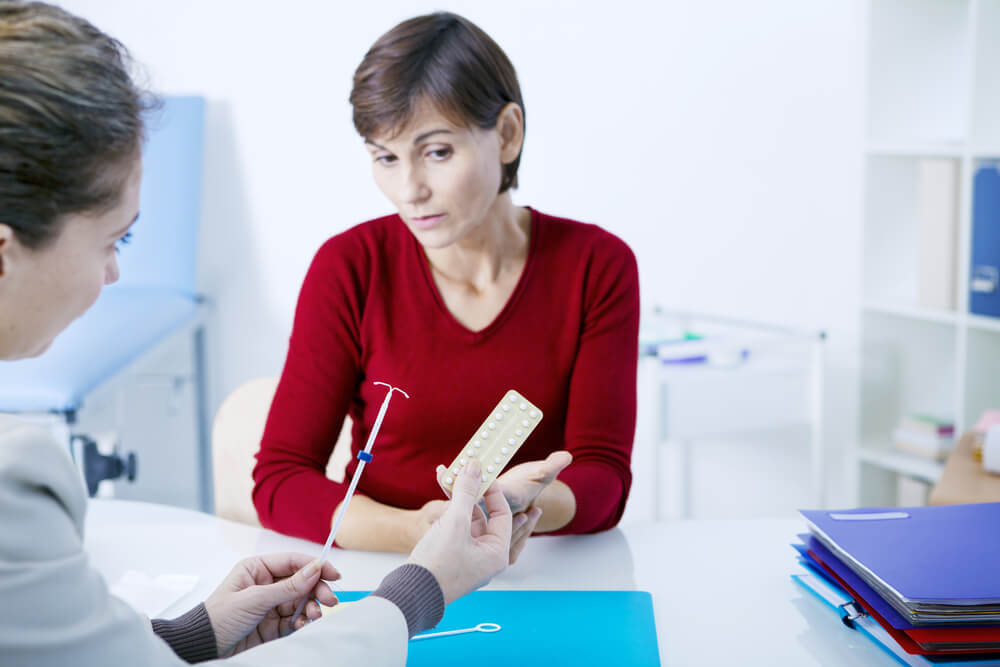Over the years, birth control pills have become increasingly common among women of reproductive age. And while oral contraceptives can be an effective method of contraception, there is some concern about the potential impact of these medications on bone health. It is important to know that the effects of birth control on bone health depend on the patient’s age and the type of birth control being used.
In this article, our experts at New Age Women’s Health will discuss the effect of birth control on bone health and the potential risks and benefits of using these medications. We will also explore the available options for women who are concerned about the impact of birth control on their bone health.
What Are Birth Control Pills?

Birth control pills, also known as oral contraceptives, are a type of medication used to prevent pregnancy. These pills contain hormones, typically a combination of estrogen and progestin, that work to prevent ovulation and thicken cervical mucus, making it difficult for sperm to reach and fertilize an egg. There are also birth control pills available now that only contain progestin and do not have any estrogen. In this article, we will refer to these pills as progestin-only pills. Otherwise, when we mention “birth control pills,” we are referring to the more common ones which contain both estrogen and progestin.
Birth control pills are a popular method of contraception among women, as they are easy to use, highly effective, and can be prescribed by a healthcare provider. Additionally, birth control pills can offer non-contraceptive benefits, such as reducing the risk of certain types of uterine and ovarian cancer, regulating menstrual periods, and helping to manage symptoms of conditions such as endometriosis, polycystic ovary syndrome, and premenstrual dysphoric disorder (commonly known as PMS).
You may have heard that long-term use of birth control pills may be linked to lower mineral bone density. It is important to note that this statement can be misleading. On the one hand, birth control pills that contain estrogen have actually been proven to improve bone health and bone strength, as estrogen directly promotes the activity of osteoblasts, which are the cells that make new bone.
Common Birth Control Side Effects
Birth control pills have a number of potential side effects, some of which are common while others are rare. Some of the most common birth control side effects include headaches, nausea, breast tenderness, and changes in menstrual bleeding. These side effects usually go away after a few months of use and are overall mild. Other potential side effects include changes in sex drive and mood symptoms.
There are also some more serious side effects associated with birth control pills, although they are rare. These include blood clots, heart attacks, and stroke, particularly in women who smoke or have certain health conditions. Women who have a history of these conditions or who are over 35 and smoke should not use birth control pills. On the other hand, in patients with these health conditions, progestin-only pills are considered safe to use.
Additionally, oral contraceptives can also interact with certain medications, such as antibiotics and anti-seizure drugs, making them less effective. Before starting birth control pills, women should inform their healthcare provider of any medications they are currently taking.
Bone Health and Birth Control
Birth control pills work by preventing ovulation and changing the lining of the uterus to make it difficult for a fertilized egg to implant. In addition to preventing pregnancy, another well-known positive side effect of birth control pills is its effect on bone health. Birth control pills that contain estrogen have actually been proven to improve bone health and bone strength. Estrogen directly promotes the activity of osteoblasts, which are the cells that make new bone. During menopause, when estrogen levels decrease significantly, patients are at higher risk of osteoporosis and bone fractures.
It is worth noting that not all birth control methods or types have the same effect on bones. It is also important to consider the patients’ age at which they start using birth control. For example, there is some research suggests that when birth control pills are started in adolescence (ages 10-19), this may lead to an increase in bone loss compared to those not taking birth control pills. This research is relatively new, and more research is needed to fully determine the effects. In adolescents, the risk of bone weakening may be lessened if other methods of birth control are used, such as progestin-only pills or an intrauterine device (IUD). It is important to note that the birth control shot/injection known as Depo Provera has been shown to cause some bone loss over time.
Keep in mind that it is vital to speak with a healthcare provider about the potential risks and benefits of birth control pills and weigh them against the individual’s needs. Additionally, it is important to ensure adequate levels of calcium and vitamin D and to engage in regular physical activity to maintain good bone health.
Maintaining Strong Bones on Birth Control

If you are concerned that the current birth control method you are using may be negatively affecting your bone health, rest assured that there are things you can do to help.
One of the most important things a person can do to maintain bone health is to ensure they are getting adequate levels of calcium and vitamin D. Calcium is a mineral that is essential for the formation and maintenance of strong bones. In contrast, vitamin D helps the body absorb calcium. Good sources of calcium include dairy products, leafy green vegetables, and fortified cereals. Vitamin D can be obtained through exposure to sunlight or by consuming foods such as fatty fish or fortified dairy products.
Another important step is engaging in regular physical activity. Weight-bearing exercises, such as walking, jogging, and weightlifting, help to build and maintain bone density by putting stress on the bones and stimulating the cells responsible for bone growth.
It is also important to have regular check-ups with your healthcare provider to monitor your bone health, especially if you have osteoporosis-related risk factors. If your doctor finds that you have low bone density, they may recommend additional measures, such as medications, to help improve your bone health.
Schedule an Appointment Today
From menstruation problems and menopause to sexually transmitted infections and urinary tract infections, the gynecologists at New Age Women’s Health have got you covered. This also includes comprehensive counseling on the best birth control solution for the concerned individual. Give us a call and find out more about the treatments we offer to women of all ages.





